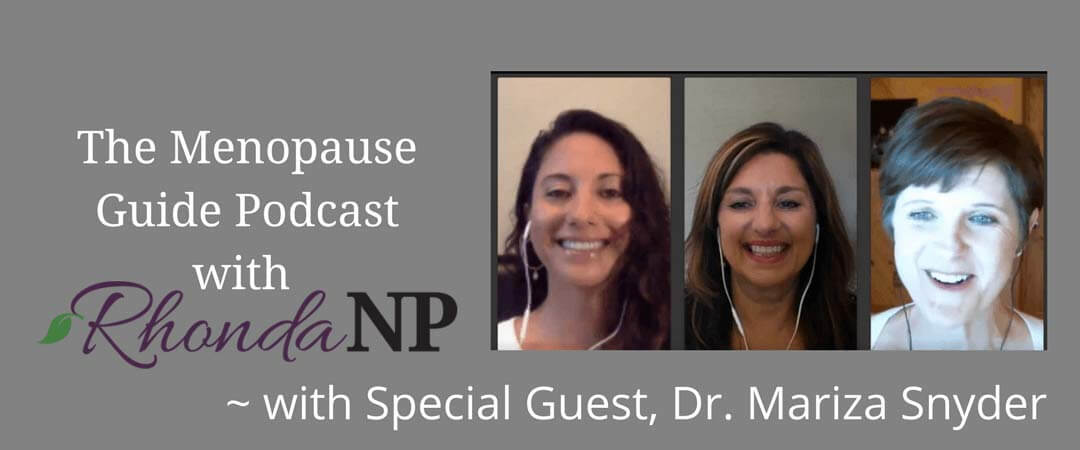Podcast: Play in new window | Download (Duration: 32:02 — 44.0MB)
In Today’s Episode
Special Guest: Dr. Mariza Snyder
Dr. Mariza Snyder, educator, Amazon best-selling author, wife and wellness advocate joins us today. She shares her recommendations for essential oils for menopause as well as some DIY recipes.
What Are Essential Oils
If you’re looking for natural solutions for perimenopause or menopause symptoms you may want to consider essential oils. But, if you are new to this concept, what are the best essential oils for perimenopause and menopause? And, you may be thinking, is this stuff for real?
Yes, essential oils are a real natural strategy for many women (and men too!). But, you need to be sure that you purchase only high quality oils from reputable vendors. Sadly, many lesser quality oils exist today and won’t produce the desired effect.
I love the safe and natural use of essential oils to support the hormonal system. It is a great adjunct to a healthy diet and lifestyle. There are a variety of oils that have specific properties to assist you body’s production and metabolism of hormones.
First: The Basics
Essential oils are high concentrations and naturally occurring volatile aromatic compounds found in the seeds, stems, roots, flowers and other part of plants. In just one example, it takes 150 pounds of lavender flowers to make one pound of lavender essential oil.
Almost as intricate as creating fine wine, producing quality essential oils depends on a variety of factors. The composition of the oil depends on many things including the season, geographic location, distillation, year grown and weather making each step critical in a quality production. Superior essential oils are far more powerful than the botanicals from which they come.
Even though it may seem that essential oils are “newer” they’ve actually been around for thousands of years. You know, even the baby Jesus was dabbed with frankincense and myrrh at his birth. Many cultures including Egypt, India, China and others since ancient times use essential oils in one form or another.
Second: How to Use
Let’s talk symptom reduction…especially how essential oils support relief of those troublesome perimenopause and menopause challenges. There are three main ways to use essential oils.
Inhalation
When the scent from essential oils is inhaled, molecules enter the nasal cavities, stimulating a mental response in the limbic system of your brain. For example, these stimulants regulate a response to various systems including heart rate, production of hormones, blood pressure and breathing patterns. There are many ways to enjoy essential oils through aromatherapy including a warm bath, hot water vapor, humidifier, perfume or using a diffuser.
Topical
When applied to the skin, essential oils’s healing components absorb into the bloodstream by the pores and hair follicles. Once in the bloodstream, they disperse to specific organs and other body systems on which they work. Applying to pulse points, areas of the body where blood vessels are closest to your skin’s surface, allows for quicker absorption. Pulse points such as wrists, temples and the back of the neck work well.
Ingestion
There is discussion about the safety of ingesting essential oils and there are valid arguments on both sides of the issue. To be safe, many essential oils are listed as GRAS (Generally Recognized As Safe) by the FDA or oral consumption.
Included on this list are Basil, Bergamot, Roman Chamomile, Cinnamon Bark, Clary Sage, Clove, Dill, Eucalyptus. Frankincense, Ginger, Grapefruit, Lemon, Lime, Lavender, Myrtle, Nutmeg, Oregano, Spearmint, Peppermint, Orange, and Thyme.
Treat essential oils as you would any medication – they are powerful! The biggest mistake someone can do is to use too much or consume them too often. Use sparingly and consult your healthcare provider. This recommendation is especially true if the condition being treated persists, worsens, or new symptoms emerge.
If you decide to try ingesting essential oils, only use high-quality food safe essential oils. A very important guideline is to always dilute your essential oils and mix well before taking. Only use one drop at a time — remember, they are powerful!


